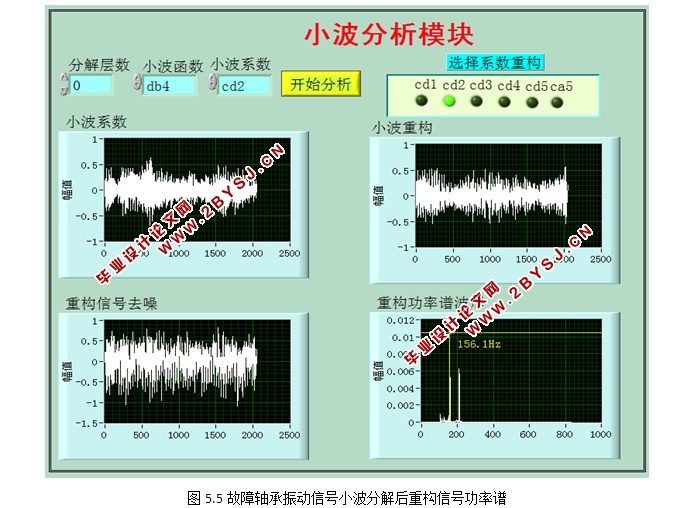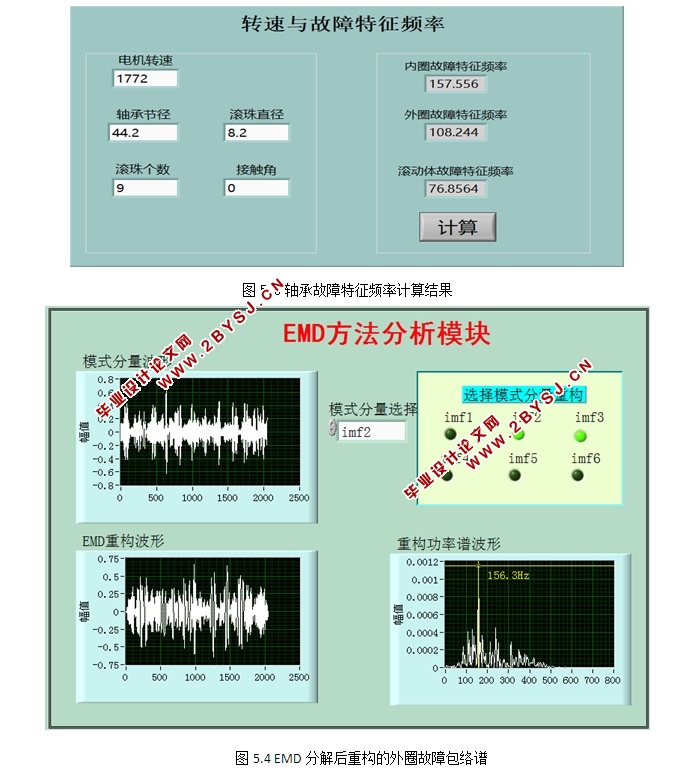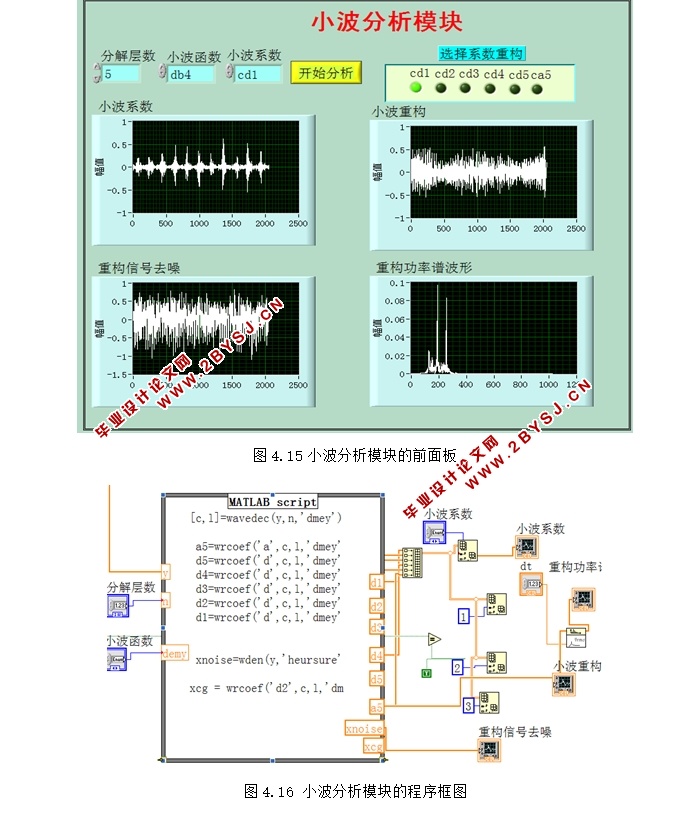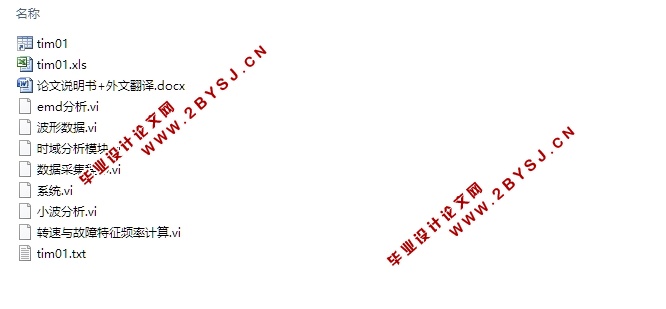基于LabVIEW的滚动轴承故障系统研究
无需注册登录,支付后按照提示操作即可获取该资料.
基于LabVIEW的滚动轴承故障系统研究(论文21000字)
摘要
滚动轴承是机械设备旋转机械中最常用的部件,在生产中起着关键性作用,因此其运行状态是否正常往往直接影响整台机器的性能。为了保证机械设备的安全运行,防止生产事故的发生,有必要对在线式滚动轴承故障诊断系统进行研究。
本文首先对滚动轴承的典型结构、故障表现形式以及故障机理进行了研究,并介绍了轴承故障诊断的常用方法,通过对比它们的优缺点,最终选择了振动信号分析法作为轴承故障诊断方法,它能够迅速、全面地提取轴承的故障特征信息,从而为轴承故障诊断系统的开发提供了理论基础。
其次,对基于振动信号的故障诊断方法做了详细的介绍,包括时域分析法、频域分析法、经验模态分解法以及小波分析法。本文提出了轴承故障综合诊断方法,该方法可以有效地提高故障诊断的效率和准确性。
最后,本文利用LabVIEW软件开发平台对滚动轴承故障诊断系统进行了总体设计。硬件方面主要包括传感器的选型、信号调理电路与数据采集装置的设计。软件方面主要实现了基于LabVIEW与MATLAB混合编程的故障诊断系统各功能模块。通过对滚动轴承故障诊断系统的实用性进行了验证。验证结果与预期基本一致,表明本文设计的轴承故障诊断系统能够有效诊断出轴承故障,具有一定的实用价值。
关键词:滚动轴承,故障诊断,诊断系统,labVIEW
ABSTRACT
Rolling bearings are the most commonly used components in rotating machinery of mechanical equipment and play a key role in production. Therefore, whether or not the running state of the rolling bearing is a direct influence on the performance of the entire machine. In order to ensure the safe operation of machinery and equipment and to prevent the occurrence of production accidents, it is necessary to study the on-line rolling bearing fault diagnosis system.
Firstly, this paper studies the typical structure, failure manifestation and failure mechanism of rolling bearing, and introduces the common methods of bearing fault diagnosis. By comparing their advantages and disadvantages, the vibration signal analysis method is finally selected as the bearing fault diagnosis method. The fault feature information of the bearing is quickly and completely extracted, thus providing a theoretical basis for the development of the bearing fault diagnosis system.
Second, the fault diagnosis method based on vibration signal is introduced in detail, including time domain analysis method, frequency domain analysis method and empirical mode decomposition method. This paper proposes an improved empirical mode decomposition method for the problems of modal aliasing and inclusion of false components in the traditional empirical mode decomposition method, and combines the traditional fault diagnosis methods with improved empirical mode decomposition. A comprehensive fault diagnosis method for bearing faults is proposed. This method can effectively improve the efficiency and accuracy of fault diagnosis.
Finally, This paper uses LabVIEW software development platform to design the rolling bearing fault diagnosis system. The hardware aspect mainly includes the selection of the sensor, the signal conditioning circuit and the design of the data acquisition device. The software mainly realizes the fault diagnosis system function modules based on LabVIEW and MATLAB mixed programming. the practicality of the rolling bearing fault diagnosis system was verified. The experimental results are basically consistent with expectations, indicating that the bearing fault diagnosis system designed in this paper can effectively diagnose the bearing failure and has certain practical value.
Keywords: rolling bearing, fault diagnosis, diagnostic system, labVIEW
本文主要内容
本论文主要论述了滚动轴承故障特征的基本理论知识,利用虚拟仪器对故障信号采集,通过分析可以发现轴承故障部位,并且可以精确地定位,从而说明该系统可用来对滚动轴承进行故障分析。本文的主要工作如下:
(1) 轴承故障机理分析:对滚动轴承的结构特点、振动机理和故障特征分别进行研究和分析,同时也介绍了滚动轴承的常见的损伤形式与故障原因,为轴承故障诊断分析提供了坚实的理论基础。
(2) 故障诊断方法研究:对基于振动信号的滚动轴承故障诊断方法分别从时域、频域以及时频域的角度进行研究,分析对比了各种方法的优缺点,最终提出滚动轴承故障综合诊断方法。
(3) 硬件设计:完成了振动传感器与数据采集卡的选型。
(4) 软件设计:以振动信号处理方法为基础,在LabVIEW软件平台上开发设计了故诊断软件。
(5) 实验论证:搭建了滚动轴承实验平台,模拟轴承故障,对正常轴承和故障轴承都进行了振动数据采集,并将采集数据送入到LabVIEW编写的分析软件中进行处理,通过实验验证了所设计的轴承故障诊断系统的实用性和准确性。
滚动轴承故障诊断的原理与技术
滚动轴承的典型结构,振动机理及故障类型
滚动轴承典型结构及振动机理
滚动轴承的典型结构如图2.1所示。其中,内圈、外圈、滚动体和保持架是轴承最重要的四个组成部分[20]。保持架将一定数目的滚动体按固定间隔均匀排列在内圈与外圈之间,避免轴承运行时滚动体之间发生碰撞造成磨损。滚动轴承在使用时,一般通过机械压装或加热装配的方式将内圈装在转轴上随轴转动,而外圈固定在轴承座上。
滚动轴承具有摩擦系数较小、启动性能优越、易于更换和维修等优点,但它也有明显的缺点,如:工作噪音大;承受冲击能力差;滚动体载荷分布不均;寿命具有离散性等。滚动轴承一般工作在高速、大载荷的环境下,所以容易出现故障。




目 录
摘 要 I
ABSTRACT II
1 绪论 1
1.1 选题的理论意义和应用价值 1
1.2 轴承故障分析技术的国内外研究现状 1
1.2.1 国外研究现状 1
1.2.2 国内研究现状 2
1.3 虚拟仪器与LabVIEW 3
1.3.1 虚拟仪器技术 3
1.3.2 LabVIEW 3
1.4 轴承故障诊断的技术难点及趋势 5
1.4.1 轴承故障诊断的主要问题 5
1.4.2 轴承故障诊断的趋势 5
1.5 本文主要内容 5
2 滚动轴承故障诊断的原理与技术 7
2.1 滚动轴承的典型结构,振动机理及故障类型 7
2.1.1 滚动轴承典型结构及振动机理 7
2.1.2 滚动轴承发生故障的类型 7
2.2 滚动轴承故障振动特征分析 8
2.2.1 滚动轴承固有振动频率 8
2.2.2 滚动轴承故障特征频率 9
2.3 滚动轴承的故障诊断常用方法 11
2.4 轴承故障诊断的流程 12
3 基于振动信号的轴承故障分析方法 13
3.1 时域分析法 13
3.1.1 有量纲参数 13
3.1.2 无量纲参数 13
3.2 频域分析法 14
3.3 小波分析方法 16
3.4 经验模态分解方法 19
3.4.1 EMD方法的基本原理 19
3.4.2 EMD分解实例 20
3.5 轴承故障综合诊断方法 21
4 滚动轴承故障诊断系统设计 23
4.1 轴承故障分析系统设计方案 23
4.2 硬件系统 23
4.2.1 传感器的选择 23
4.2.2 数据采集卡的选择 24
4.3 软件系统设计 25
4.3.1 软件总体架构 25
4.3.2 信号采集与存储模块 26
4.3.3 时域分析模块 27
4.3.4 转速与故障特征频率计算模块 28
4.3.5 EMD方法分析模块 29
4.3.6 小波分析模块 30
5 故障诊断系统功能的验证 32
5.1 时域参数分析 32
5.2 轴承故障特征频率的计算 33
5.3 EMD方法分析 34
5.4 小波分析 35
6 总结 37
附录A 外文资料翻译 40
附录B 外文资料原文 45
致 谢 49
